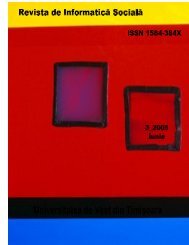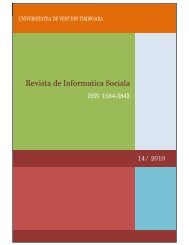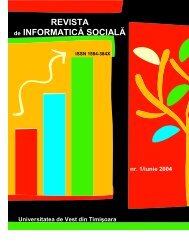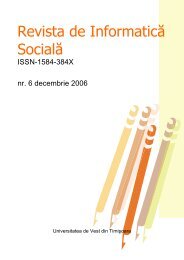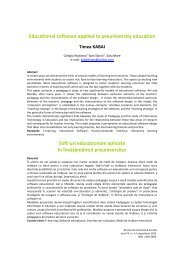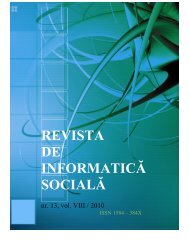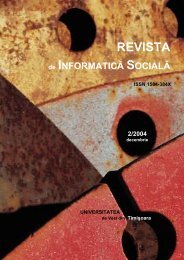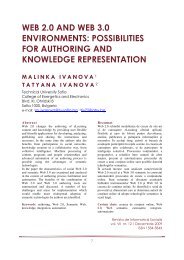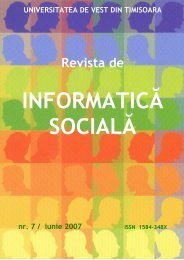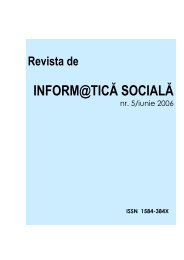Download - Journal of Social Informatics / Revista de Informatica ...
Download - Journal of Social Informatics / Revista de Informatica ...
Download - Journal of Social Informatics / Revista de Informatica ...
Create successful ePaper yourself
Turn your PDF publications into a flip-book with our unique Google optimized e-Paper software.
The conclusion <strong>of</strong> our statistical analysis is that the great number <strong>of</strong> stu<strong>de</strong>nts with low interest for<br />
individual study based on the wiki resources is mainly due to the low frequence <strong>of</strong> teacher<br />
feedback, low attendance <strong>of</strong> face-to-face meetings (no compulsory attendance was stipulated at the<br />
beginning <strong>of</strong> the semester) and, finally, the stu<strong>de</strong>nts’ own type <strong>of</strong> involvement in the learning<br />
activity, namely slow start and increased frequency after mid-semester and at the end-<strong>of</strong>-semester<br />
intervals, when assessment constraints became imminent.<br />
4. CONCLUSIONS<br />
Due to the transition to the semantic web where most activities are carried out un<strong>de</strong>r the sign <strong>of</strong><br />
collaboration and the results <strong>of</strong> numerous studies/ surveys attesting Web 2.0 technologies’<br />
beneficial impact on learning, we have <strong>de</strong>ci<strong>de</strong>d to introduce the wiki as a component <strong>of</strong> a blen<strong>de</strong>d<br />
learning approach to learning English for Specific/Aca<strong>de</strong>mic Purposes.<br />
Our research will continue with corrections and adaptations <strong>of</strong> the wiki platform in or<strong>de</strong>r to meet<br />
the needs <strong>of</strong> stu<strong>de</strong>nts by creating a balance <strong>of</strong> face-to-face meetings and wiki presence, a regular<br />
feedback pattern teacher-stu<strong>de</strong>nts and distributing tasks and assessment/ self-assessment activities<br />
during the semester interval.<br />
A long-term goal would be to i<strong>de</strong>ntify stu<strong>de</strong>nt pr<strong>of</strong>iles based on an interdisciplinary approach<br />
(cultural, educational, <strong>de</strong>mographic, language level dimensions) that would allow us to personalise<br />
the collaborative learning process into more efficient working groups. This would help us build a<br />
<strong>de</strong>termining/<strong>de</strong>fining pattern <strong>of</strong> relationships based on methods from the game theory that would<br />
help optimise the learning process and bring about enhanced pr<strong>of</strong>essional, social and personal<br />
results for all parties involved.<br />
REFERENCES<br />
1. Carver, D., (1983). Some propositions about ESP. In The ESP <strong>Journal</strong> no. 2, pag: 131-137.<br />
2. Constructivismul in educatie, http://inovatie.numeris.com.ro/E.Noveanu-Constructivismul.pdf.<br />
3. Digital competitiveness: http://ec.europa.eu/information_society/newsroom/cf/item-<strong>de</strong>taildae.cfm?item_id=6499<br />
4. Dillenbourg, P., Baker, M., Blaye, A., O'Malley, C., (1996). The evolution <strong>of</strong> research on<br />
collaborative learning. In E. Spada and P. Reiman (eds). (1996). Learning in Humans and<br />
Machine: Towards an interdisciplinary learning science. pag: 189-211. Oxford: Elsevier.<br />
5. Doise, W., Mugny, G., (1984). The social <strong>de</strong>velopment <strong>of</strong> the intellect. In Doise, W. and<br />
Mugny, G., (1984). Dezvoltarea socială a intelectului. Oxford: Pergamon Press. Oxford:<br />
Pergamon Press.<br />
6. Drugan, T., Achimas, A., Tigan, S., (2005). Biostatistică, Editura SRIMA, Cluj-Napoca.<br />
7. Eurostat. Information Society Statistical Data, (2009). URL: http://epp.eurostat.ec.europa.eu/<br />
portal/page/portal/information_society/data/main_tables. Accessed 22 December 2010.<br />
8. Flash Eurobarometer nr. 260, (2009). Stu<strong>de</strong>nts and Higher Education Reform, URL:<br />
http://ec.europa.eu/public_opinion/flash/fl_260_en.pdf Retrieved 10 March 2010.<br />
9. Freeman, R. E., (1984). Strategic Management: A Stakehol<strong>de</strong>r Approach. Pitman Publishing<br />
Inc., Marshfield, MA.<br />
10. Friedman, M., (1962). Capitalism and Freedom. University <strong>of</strong> Chicago Press, Chicago, IL.<br />
11. Goodsell, A., Maher, M., Tinto, V., Leigh Smith, B., MacGregor, J., (1992). What Is<br />
Collaborative Learning? in Collaborative Learning: A Sourcebook for Higher Education, The<br />
National Center on Postsecondary Teaching, Learning, and Assessment at Pennsylvania State<br />
University.<br />
12. Harmer, J., (2007). English Language Teaching, Pearson. Longman.<br />
13. Harriman, G., (2010). Learning 2.0: fad, new pedagogical, or something else?, http://www.gray<br />
harriman.com/learning2.htm. Retrieved 30 March, 2010.



